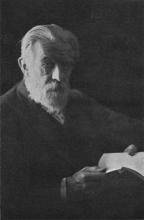Friedrich Maria Aloys Franz Karl Freiherr von Hügel was born 5 May 1852 in Florence, Italy to Charles von Hügel, an Austrian ambassador to the Grand Duchy of Tuscany, and Elizabeth Farquharson, a Scottish Catholic. Despite his Austrian and Scottish heritages, and his birth in Italy, it was England, where his family moved in 1867, that he considered to be his home.
He married an English Roman Catholic, Lady Mary Catherine Herbert, whose father was a supporter and confidant of Florence Nightingale.
From his father, von Hügel inherited an interest in science, which he said gave him respect for empirical evidence. Although he was not a strong proponent of evolution, he shared with other modernists a belief that science had raised new questions for religious faith and that undermined any naive suppositions that believers could rely purely on dogmatic authority as a source of truth.
Contrary to what one might expect of a scholar suspicious of dogmatism, Von Hügel was deeply concerned by biblical criticism that called into question the historicity of much of the Bible. He sought to overcome these strains of criticism by appealing to the sense of ‘transcendence,’ which he considered basic to the human soul. If the soul is truly open to experience and appropriately guided, Von Hügel thought, it realizes that there are higher, deeper, more mysterious realities beyond the empirical, of which natural explanations are incapable of pinning down. These higher realities are the stuff of true religion, making recourse to the language of higher experience all too necessary. Von Hügel became a student of this ‘experience’, especially of the phenomenon of mysticism, in which the soul is drawn into a sense of complete union with God, which cannot be expressed or formulated in words or images.
Von Hügel’s chief work on religion was a study of a lesser known medieval mystic, St. Catherine of Genoa.
Even in his own day, von Hügel was regarded as a man of many paradoxes. In a way he functioned as a kind of broker for the modernist movement. Von Hügel made them familiar with each other’s work, served as a clearing house of information, and offered strong moral support to those modernists who were censured by ecclesiastical authority. (Probably because he was a layman, he himself received no personal censure, even after the Church all but condemned modernism.)
Like other modernists, Von Hügel did not favor scholasticism, a term that includes several strains of Catholic systematic theology originating in the later Middle Ages. Unlike other modernists, however, he objected to Scholasticism not on the grounds that the Christian religion is defunct and rationally untenable, but that scholasticism was an overly dogmatic, dead system that obscured true religion. Von Hügel’s modernism constituted a shift of emphasis from unqualified trust in dogmatic authority and radical abandonment of tradition to careful examination of traditions according to critical scholarship. As if his willingness to interrogate tradition carefully was not enough to set him apart from other modernists, von Hügel considered himself an ultramontanist (which means ‘beyond the mountains;’ ie. in Rome, beyond the French Alps), a name given to those who strongly supporters of the authority of the pope over local parishes, diocesan bishops, and national Church communions. But, despite his professed loyalty to the papacy as an institution, he belonged to an intellectual movement (that is, modernism) that the papacy condemned. Such was the line he walked as a devout Catholic and a public intellectual. He was known to spend hours in front of the Blessed Sacrament or praying the rosary—practices consistent with his sense of the faith as essentially an inner spiritual reality, and practices which made his hybrid identity as a traditionally religious man and a modernist all the more intriguing.



